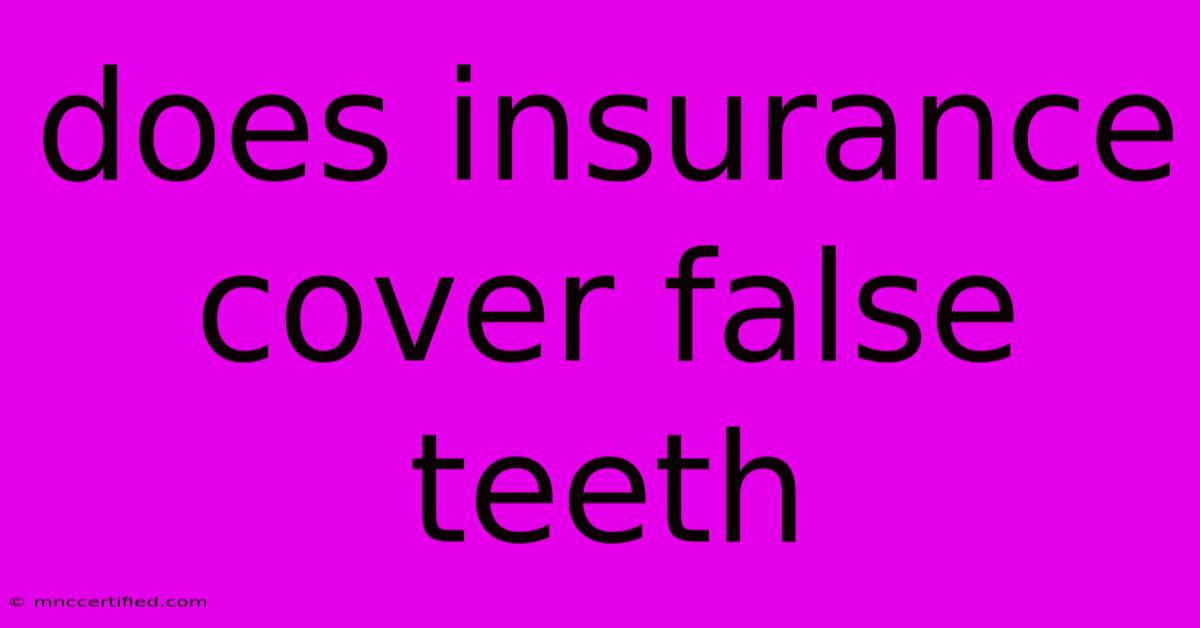Does Insurance Cover False Teeth

Table of Contents
Does Insurance Cover False Teeth? A Comprehensive Guide
Losing your teeth can be a significant life event, impacting your confidence, diet, and overall health. The cost of replacing missing teeth with dentures or implants can be substantial, leading many to wonder: does insurance cover false teeth? The short answer is: it depends. This comprehensive guide will delve into the intricacies of dental insurance and its coverage of dentures and other tooth replacement options.
Understanding Dental Insurance Coverage
Dental insurance policies vary greatly between providers and plans. While some offer robust coverage for restorative procedures, others may have limited or no coverage for false teeth. The extent of coverage hinges on several factors:
- Type of Plan: Basic plans often cover preventative care (cleanings, exams) and some basic restorative treatments, but may not include dentures or implants. More comprehensive plans are more likely to offer partial or full coverage.
- Policy Details: Carefully review your specific policy document. Look for details on coverage limits for dentures, the percentage of costs covered (e.g., 50%, 80%), and any annual maximums. Understanding your policy's exclusions is equally crucial.
- Reason for Tooth Loss: Insurance companies may consider the cause of tooth loss when determining coverage. Coverage might be more readily available for tooth loss due to an accident or injury covered under your policy, compared to tooth loss due to decay or gum disease.
- Type of False Teeth: Coverage for different types of tooth replacement varies significantly. Full dentures may receive different coverage than partial dentures, and implants often have separate coverage stipulations or require pre-authorization.
Dentures: Coverage Variations
Dentures, both full and partial, are prosthetic devices designed to replace missing teeth. While some insurance plans may offer partial coverage for dentures, it's not guaranteed. The coverage amount can vary widely, and you'll likely face significant out-of-pocket expenses. Factors influencing coverage might include:
- Medical Necessity: Your dentist will need to demonstrate that dentures are medically necessary for your oral health.
- Frequency of Replacement: Insurance policies may limit coverage for denture replacements to a specific timeframe, for instance, every five years.
Dental Implants: A Separate Consideration
Dental implants are surgically placed into the jawbone to provide a stable foundation for artificial teeth. These are generally more expensive than dentures. Insurance coverage for dental implants is typically even less common than for dentures. Many policies consider them cosmetic rather than medically necessary. However, in cases of significant bone loss or jaw reconstruction following an accident, coverage may be more likely.
Maximizing Your Insurance Benefits for False Teeth
To maximize your chances of receiving insurance coverage for false teeth, consider the following:
- Choose an In-Network Dentist: Using a dentist within your insurance network can lead to lower costs and simplified billing procedures.
- Pre-Authorization: Always check with your insurance company before receiving any treatment to determine coverage and obtain pre-authorization if required. This prevents unexpected bills.
- Explore Different Payment Options: If your insurance doesn't fully cover the cost, explore options like dental financing plans or payment plans offered by your dentist.
- Understand Your Policy Thoroughly: Read your policy carefully and don't hesitate to contact your insurance provider with questions.
Beyond Insurance: Affording False Teeth
Even with insurance, the cost of dentures or implants can be substantial. Here are some avenues to explore if you are facing financial challenges:
- Dental Schools: Dental schools often offer reduced-cost dental care performed by students under the supervision of experienced dentists.
- Government Assistance Programs: Depending on your location and income, you may qualify for government assistance programs that help with the cost of dental care.
- Charitable Organizations: Some charitable organizations provide financial assistance for dental procedures to individuals in need.
Conclusion: Planning for the Future
The question, "Does insurance cover false teeth?" doesn't have a simple yes or no answer. The level of coverage largely depends on your specific insurance plan, the type of replacement needed, and other contributing factors. Proactive planning, thorough research, and open communication with your insurance provider and dentist are crucial for navigating the complexities of tooth replacement costs and securing the best possible outcome. Don't hesitate to seek multiple opinions and explore all available options to find an affordable solution that suits your individual needs.

Thank you for visiting our website wich cover about Does Insurance Cover False Teeth. We hope the information provided has been useful to you. Feel free to contact us if you have any questions or need further assistance. See you next time and dont miss to bookmark.
Featured Posts
-
Penn Sustainability Plan Key Priorities
Nov 21, 2024
-
Family The Unbreakable Bond Ep 1
Nov 21, 2024
-
Chad Murray Dance Discovery In Merry Gentlemen
Nov 21, 2024
-
Jl Massie Insurance Lewisburg Wv
Nov 21, 2024
-
Brooks And Dunn Jelly Rolls Cma 2024 Show
Nov 21, 2024